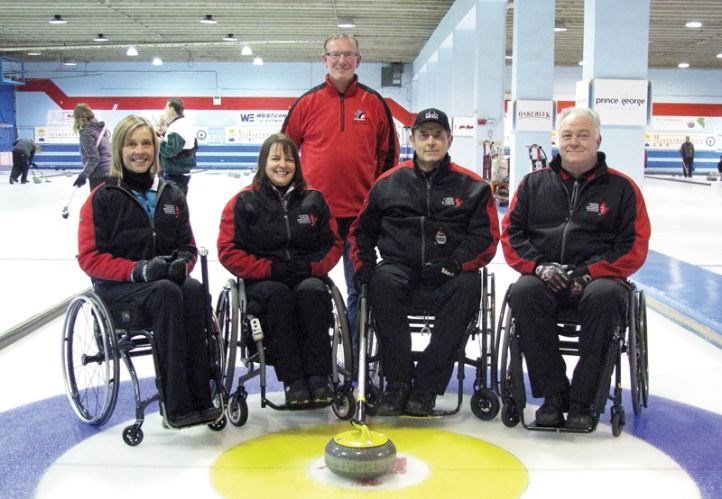Three Paralympics, three gold medals.
Joe Rea, head coach of Canada's wheelchair curling team, would be perfectly happy to keep the streak alive indefinitely.
"I don't think it will ever get old -- if we get 50 of them, it would still be fantastic," said Rea, whose most recent Paralympic victory came last Saturday in Sochi, Russia, where Canada beat the host team 8-3 in the final.
Rea was also at the helm of Team Canada when it grabbed gold at the Paralympics in Torino (2006) and Vancouver (2010). The team entered the Sochi Games as the favourite once again.
"It's always a little bit of pressure," said Rea, a 55-year-old Prince George resident who started coaching wheelchair curling locally in 2003. "You try and put it to the back of your head but people are saying that word 'threepeat' and that sort of thing.
"You don't want to be looking at the outcome because every Games is different," Rea added. "Torino was the first one so that was special, Vancouver was special because we were with our families and friends... and this one here was special because we had two new players on the team that hadn't been there before and it was special because of where we were. Just the thought of going to Russia to play in something like this, it's not something that had crossed my mind ever, and they put on a wonderful Games."
This version of Team Canada featured Jim Armstrong at skip, Ina Forrest at third, Dennis Thiessen at second, Sonja Gaudet at lead and Mark Ideson in the alternate position. Thiessen and Ideson were first-time Paralympians.
At the Games, Canada rolled through round-robin play with a 7-2 record and then edged a tough China team 5-4 in the semifinals. Russia, meanwhile, went 8-1 in round robin (its only loss a 5-4 setback to Canada) and defeated Great Britain 13-4 in its semifinal game.
Against Russia for gold, Canada gave up two points in the first end but dominated after that. The Canadians scored a single point in the second end and then, over the next four ends, stole a total of seven points.
"They lit it up in the final game," Rea said of his players. "Although we gave them a deuce in the first end we erased that pretty quick and, really, never looked back. It's not that Russia didn't play really well, it's just that our guys, that was probably one of the best outings I've seen them have, ever."
With gold on the line, Canada was 80 per cent successful in its shot-making, remarkable considering the fact that, in wheelchair curling, players use delivery sticks and don't have the benefit of sweepers to influence the weight and line of their rocks.
As a coach, Rea didn't receive a medal and isn't bothered by that in the least. What he takes away from these and past Paralympics is a sense of pride in Canada's accomplishments.
"We're supported very well by Own the Podium and the Canadian Curling Association so when you look at our group versus others in the world, we're supported as well or better than any one of them," Rea said. "So, we probably have the best chance to be successful."
Perhaps the biggest challenge in Sochi was the condition of the ice, especially during round-robin play. Rainy weather early in the week contributed to tricky, unpredictable playing surfaces inside the Ice Cube Curling Center.
"We got rain for three or four days right off the get-go and they didn't have the equipment to take the moisture out of the building," Rea said. "We use dehumidifiers here, and they had one, but it was just undersized for what they were doing.
"The icemakers, those guys worked day and night," Rea added. "The one icemaker from Germany, he was next to tears he was feeling so bad."
In Sochi, a subtropical resort city on the Black Sea, the outdoor temperatures also soared into the low 20s on the Celsius scale.
"I've got a picture of me in a pair of shorts and a shirt at 22 degrees," Rea said. "In fact, the Paralympic clothing package included a pair of shorts in it this year. I've never seen that before, but we used them."
Rea, who works as a project coordinator at Canfor's Northwood Pulp, plans to continue his involvement in the Canadian wheelchair curling program. That is, of course, as long as he has the blessings of his wife, Colleen.
"When I got home [on Tuesday night] my wife didn't tell me that I had to quit," he said with a chuckle. "It's busy. I do this off the corner of my desk and I've got to say thanks to Canfor for allowing me the time off at certain times to go. They've been really good to me that way.
"And family is the biggest thing," added Rea, who has children, grandchildren and foster kids. "It's such a sacrifice for all of them to have you away. I'm away every second or third weekend, and that went right through the summer last year. We were training right up until July, we took August off, and we started again in September."
The next Winter Olympics and Paralympics are in 2018 in Pyeongchang, South Korea.



